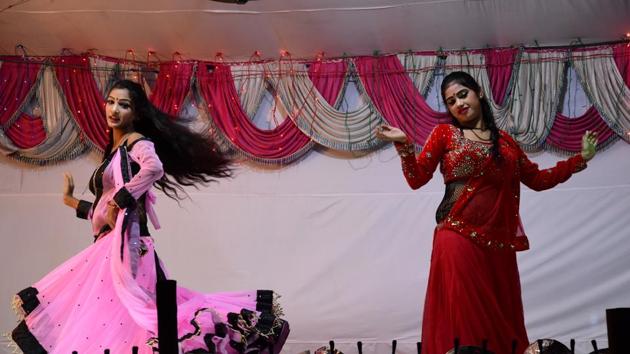When dancing means survival
With too many mouths to feed, these young dancers from Uttar Pradesh brave society’s disdain, ogling eyes and sore muscles to put up a performance. We spent a day with them when they visited the city recently to dance at a fair.
An infant sleeps on a rickety cot placed under a metal shed. Squatting on the ground, his father Arun insistently wards off curious flies sketching a halo on the child’s head. Barely 25 days old, the child has been named Varun — the god of oceans. His mother Karishma sits on another cot stretched close by, dotting her face with yellow pancake. Next, she deftly outlines her lips with dark purple lip liner. “Youtube par dekha thaa kaise lagate hain,” Karishma tells me. Her friend Pinky pours some cola for us in a steel glass. “Baithiye naa, abhi show mein time hai, araam se baat karte hain,” she gestures, pointing at the cot.

Karishma and Pinky are part of a dancing troupe from Uttar Pradesh that has come to perform at the Lal Qila Maidan, Old Delhi. Accompanying them are Nisha, Vidya and Aarti. They take turns to talk as they keep beautifying their makeup, choosing from glittery eye shadows, fake lashes, bright lipsticks and kajal pencils heaped on the cot.

Karishma begins first. “I have come with my husband. My baby Varun is also with us. I learnt dancing by watching Bollywood films. My husband can’t earn enough so I dance at parties to keep our stomachs full.” Karishma, 23, married a farmer two years ago.
Pinky is older, about 27. “I have two school-going children, a girl and a boy. I want them to become officers. When I dance, my body often aches but my feet don’t stop. I have to fulfil their dreams,” she says. Her in-laws back home don’t know that she dances for money. “Woh nahin samjhengen...kala hai..galat nahin hai…lekin hum unko nahin batate..bol dete hain theka mila hai, Dilli jaa rahe hain 10 din ke liye (they won’t understand..it’s art..nothing wrong in it, but we just tell them that I have got a contract, we are going to Delhi for 10 days),” says Sonu, whose farming doesn’t fetch him enough money to take care of his family.
Nisha, Vidya and Aarti are married, too, with small children back home, waiting for them in the village to return with sweets, toys and clothes from Delhi’s Chandni Chowk. “Parhe likhe toh hai nahin, aur kya kaam karenge? Bachche parh jaayen, isiliye naach rahe hain (We are not educated, so what else to do? We are dancing so that we can educate our children,” says Nisha.

Girls are only allowed to dance after marriage, once they have a ‘protector’, their husband, such is the tradition in their village. “Pati saath ho toh himmat rehti hai..(we feel courageous if our husbands are with us), ” says Pinky. When anyone in the audience tries to misbehave, Pinky signals her husband to deal with them. But no one can reach the stage or touch the girls. If a guy creates trouble, the husbands call the policemen stationed everywhere in the fair. But sometimes, men pass dirty comments, which make Sonu angry. “Kabhi kabhi mann mein aata hai, marein unko par kya karein (Sometimes, I feel like beating them up, but I am helpless,” he says. The crowd is evolving, insists Aarti. “Earlier, it was only men who would buy the tickets. Now, people come with wives and children,” she says.
Our little chat has delayed today’s performance. The organiser is getting restless. The girls rush to change. We stand in the queue to buy two tickets priced at ₹50 each. Crossing iron railings, we walk into the tent with a raised stage in the centre, and gaudy fabric curtains. About 70 iron chairs have been placed in straight lines. The girls have begun today’s performance with the disco hit Ladki Aankh Mare.

We see young and old men — mostly the working force of the city, the migrants from India’s numerous kaleidoscopic villages, cheering and vying for the performers’ attention, recording videos. There are three burqa clad women sitting in the centre, with restless toddlers tucked in their laps. I remember Aarti telling me how she felt good to see women in the crowd. Once, a woman in the audience had called her an artist. Aarti cherishes those words. The girls have now switched over to Tu Jab Jab Mujhko Pukare from the 90s hit Kurbaan.
The girls wave to us as they notice we leaving. One of them is stepping down the stage to feed her infant. Breaks are limited and short. It’s going to be a long performance. We walk out of the tent. The weary old man sitting on the raised metal platform outside keeps inviting passersby in with a mike in his hand: “Aaiye, kahan chal diye? Aaiye, dekihye, aaj ka show…sirf 50 ka ticket hai aapke liye.” He has to ensure a houseful or else someone else will take his place. ‘Sapka pet paalna hai (Have to feed so many mouths),” as Sonu puts it.






